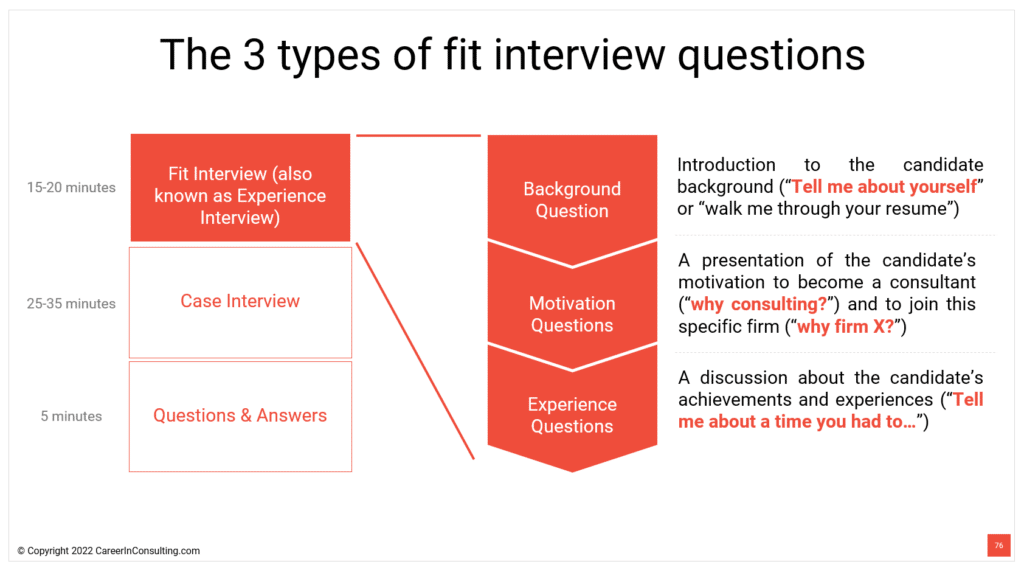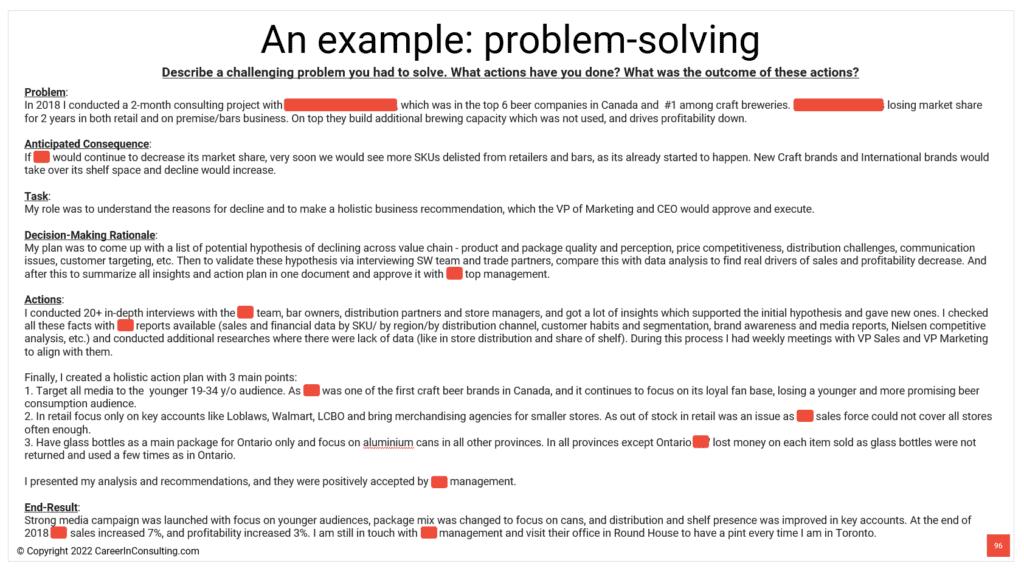Are you good at telling stories?
Do you get to the point and include all the relevant details without rambling?
Or do you tend to forget to mention some key context or struggle to tell an easy-to-follow narrative with a clear takeaway?
What if you add the stress of a job interview with a $150k offer at stake?
In today’s article, we will discuss how to build a well-structured story about your past work experience in response to an interview question such as « tell me about a time when… ».
Table of Contents
What is the STAR framework?
According to Wikipedia:
The situation, task, action, result (STAR) format is a technique used by interviewers to gather all the relevant information about a specific capability that the job requires.
- Situation: The interviewer wants you to present a recent challenging situation in which you found yourself.
- Task: What were you required to achieve? The interviewer will look to see what you were trying to achieve from the situation.
- Action: What did you do? The interviewer will be looking for information on what you did, why you did it, and what the alternatives were.
- Results: What was the outcome of your actions? What did you achieve through your actions? Did you meet your objectives? What did you learn from this experience? Have you used this learning since?
In my own words:
Situation: describe the problem you had to solve.
Task: clarify what your main responsibility was.
Action: explain the actions you did to solve the problem.
Result: detail the outcome of your actions.
When to use the STAR framework?
The STAR framework is best used to answer experience questions (also known as PEI questions or behavioral questions).

This means:
Use the STAR framework when an interviewer asks you to provide a concrete example of how you have handled a certain type of situation in the past.
For instance, an interviewer would ask a question that starts like this:
Tell me about a time when…
Give me an example of…
Describe a situation when…
Have you ever…
Please note that these questions are popular in non-consulting job interviews as well, like at Amazon or other tech companies.
Why do interviewers ask those questions?
Throughout their recruitment process, consulting firms such as McKinsey, BCG, or Bain & Company try to identify the most qualified candidates from a large pool of applicants.
Some critical consulting skills can not (or are more difficult) to test via the traditional case study method.
That’s why:
Interviewers ask candidates to describe their actions to past experiences in the context of skills critical to a consultant’s success.
In other words:
Consulting firms test critical consulting skills by exploring past behavior to predict future behavior in a similar situation.
To do so, an interviewer follows this 4-step approach:
- Identify a skill to test (Leadership, communication, teamwork, creativity, drive to results, etc.).
- Select an experience question to test this skill.
- Ask the question to understand a specific job, school, or community experience where the candidate displayed critical skills.
- Then, ask probing questions to understand circumstances, roles, motivations, actions, and results of the past experience to evaluate the candidate on the given skill.
Here are five behavioral questions you might get in a consulting interview (I’ve also added the consulting skill tested):
Provide an example of how you assessed a situation and achieved good results by focusing on the most important issues (Drive to results).
Tell me about a time when you worked with a person who did things differently from you. How did you get the job done? (Teamwork).
Tell me about a time when you had to present complex information to a customer, a supervisor, or a peer. How did you ensure that your audience understood? (Communication).
Tell me about a time you influenced the outcome of a project by taking a leadership role. (Leadership).
Give me an example of a situation you had to handle in which old solutions did not work. How did you handle it?
Get 4 Complete Case Interview Courses For Free

You need 4 skills to be successful in all case interviews: Case Structuring, Case Leadership, Case Analytics, and Communication. Join this free training and learn how to ace ANY case questions.
The STAR framework revisited (for consulting interviews)
Knowing what the acronym stands for is only the first step; you need to know how to use it in the context of a consulting job interview.
Here is exactly what you need to do:
Step #1 – set the scene: share some information about the context (when & where the problem happened).
Step #2 – lay out the problem: paint a clear picture of the problem (the gap between the current and desired states).
Step #3 – highlight why the problem: explain the consequences of not solving the problem.
Step #4 – clarify your role: explain exactly what your role was in resolving the problem.
Step #5 – share your thinking process: explain your logic (exactly like frameworks in case interviews) that led to your actions.
Step #6 – detail the actions you did: explain which steps you took to solve the problem.
Step #7 – discuss the results: explain the impact you had and share the outcome of your actions.
A STAR framework example answer
Here is a complete STAR framework example answer (some elements are hidden to respect confidentiality):

A STAR framework: final words
Preparing solid STAR-framed stories takes time.
Start with listing the PEI questions you can have in your interviews.
Then, prepare what stories you might use for each of those PEI questions.
When you prepare your answers, you might need some help in choosing which of your past experiences best match consulting requirements and turning those experiences into compelling stories.
If it is the case, contact us to discuss how I can help you craft memorable answers and land offers in consulting.
Sébastien, founder of careerinconsulting.com
Get 4 Complete Case Interview Courses For Free

You need 4 skills to be successful in all case interviews: Case Structuring, Case Leadership, Case Analytics, and Communication. Join this free training and learn how to ace ANY case questions.
SHARE THIS POST
